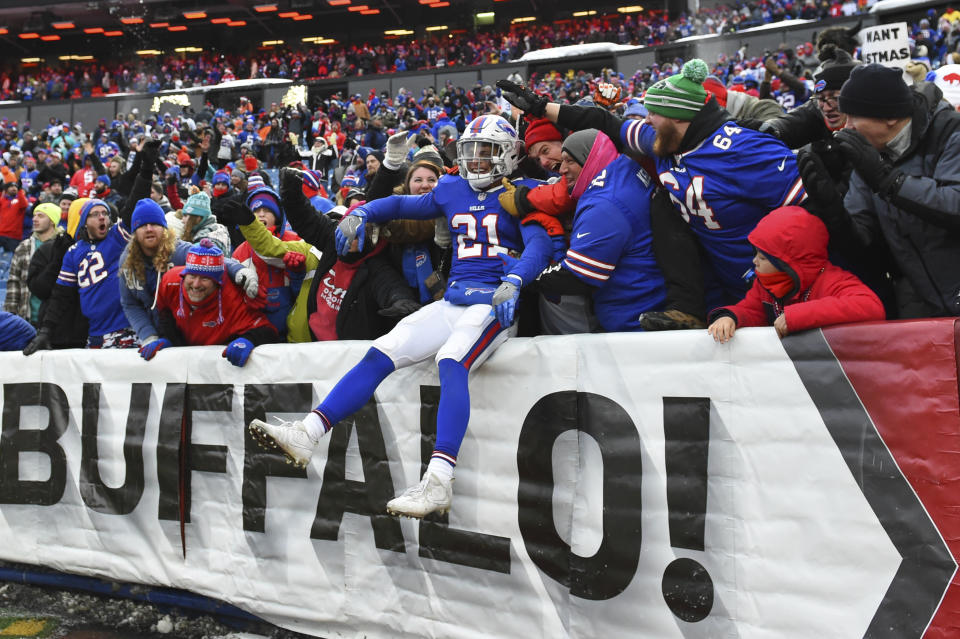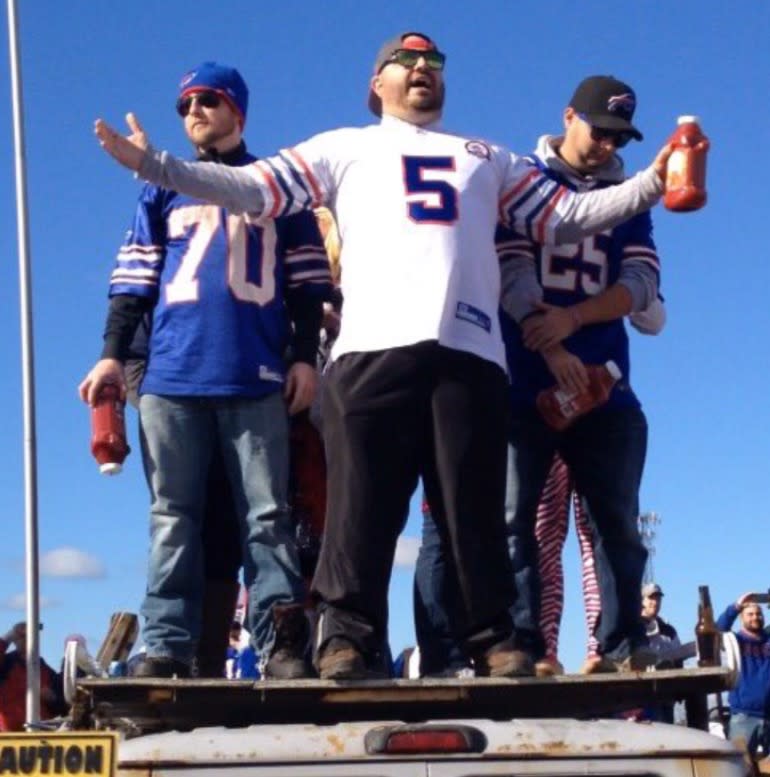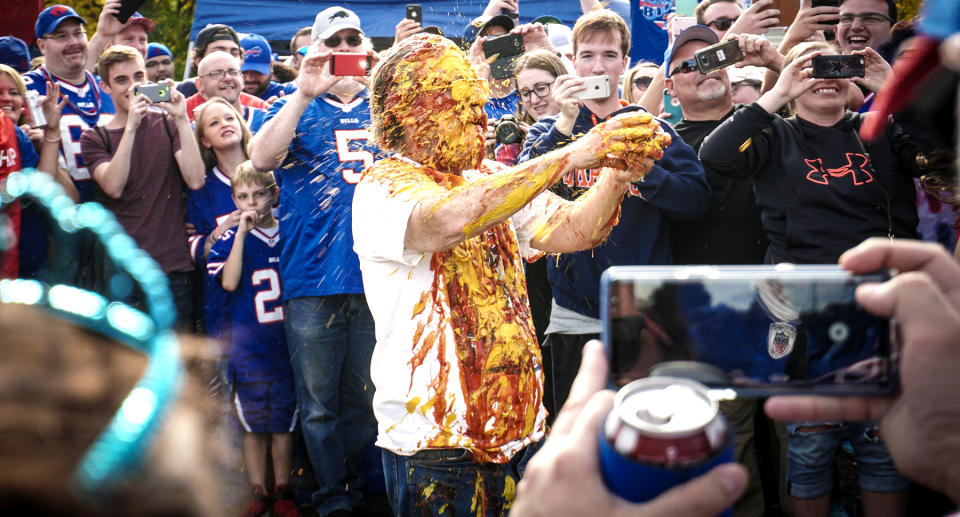How Bills Mafia became a thing
The last time the Buffalo Bills were in the playoffs there was no Twitter. No Facebook. No YouTube. No Skype. No Reddit. No MySpace.
There was Netscape. And there was Napster.
“Viral” was something that happened after you spent eight hours outside in the Western New York cold, tailgating for a team that wouldn’t make the playoffs for 17 years.
And that’s a good segue into #BillsMafia. Even though the team hasn’t been good since the dial-up era, the fans have a new-age story to tell. And it’s far more clever than dudes jumping off cars and onto burning tables in a parking lot.

“Bills Mafia” began with a tweet. In November of 2010, Bills receiver Stevie Johnson dropped a touchdown pass that would have given Buffalo a shocking upset over the Steelers. Pittsburgh won in overtime and later that evening, Johnson blamed the Almighty on social media: “YOU EXPECT ME TO LEARN FROM THIS??? HOW???!!! ILL NEVER FORGET THIS!! EVER!!! THX THO…”
This became a big deal, to the point where “The View” discussed the tweet the next day. Then, hours later, ESPN’s Adam Schefter retweeted Johnson. A group of Bills fans thought it funny that a breaking news wizard had just discovered a tweet that had already been viral for the better part of a day. They created a hashtag mocking #SchefterBreakingNews with such bulletins as “Man Discovers Fire.” You get the idea.
The Bills fans reveled in having gone rogue and one of the leaders, a man named Del Reid, coined the hashtag #BillsMafia. Months later, former Green Bay Packer Nick Barnett signed with the team, saw the hashtag and tweeted his approval. Things took off from there, as they do in the social media age, and the zaniness grew even more when Johnson himself suggested a Bills Mafia handle. Reid launched that – @TheBillsMafia – and one Sunday morning in church his notifications blew up as fans across the region followed.
“Now a player will sign through free agency,” Reid says, “and often that player will follow our account.”
All this happened as the Bills whiled away in mediocrity. Reid, himself, worked at a call center when the team last made the playoffs in the 1999 season. He was at work when the Music City Miracle shredded the region’s heart, and he sheepishly admits he let a few phones ring off the hook when Kevin Dyson sprinted across the goal line and Titans announcer Mike Keith yelled, “There are no flags on the field!”
Now Reid has a wife and two daughters, ages 14 and 11. “My kids have always wondered, ‘Why the heck do you watch this team?’ ” he says. “‘Why do you keep doing this?'”
Reid always had a ready answer, launching into a soliloquy about his youth. “Just wait,” he tells the kids. “When the team is good, the city comes alive. Something is different when they play meaningful games in January. Every business has a sign in the window with some unauthorized use of the Bills logo.”


Sure enough, Andy Dalton’s late-game heroics on Sunday vaulted the Bills into the playoffs and Bills Mafia – now a worldwide group – has donated more than $100,000 to the charity of a Bengals quarterback. Many of those donations have come in $17 increments, a nod to 17 years without the playoffs.
“Seventeen years has grown some bitterness,” Reid says. “You may see crazy, bitter fans. But we are a giving lot.”
So what started as a joke among friends turned into a hashtag, which turned into a movement, which turned into a charitable cause.
But of course social media always has to have a downside, and in this case it’s this: a lot of people think “Bills Mafia” is a bunch of loons who climb on top of vans and crash through kerosene-doused folding tables.
#BillsMafia goes up in flames pic.twitter.com/GAmEoMkPqV
— Everything Buffalo (@EverythingBuf) January 4, 2016
“It’s one or two [tailgate] lots,” Reid says. “People think it’s all over. Most Bills fans are people cooking hot dogs and saying how much they hate Tom Brady.”
You can burn a Brady, but it’s your season that is going up in flames #BillsMafia pic.twitter.com/V2rqcRw4rW
— BosSportsExtra⚾⚽ (@BosSportsExtra) December 3, 2017
There is some resentment about the runaway reputation of the tailgate table crashers. Nick Papagelis, 32, struggles at times to differentiate the WWE-style shenanigans with his own tailgate routine: pouring ketchup and mustard on an older gentleman named “Pinto Ron.”
“They kinda give us a bad name,” Papagelis says. “‘No, we’re the guys who squirt ketchup on the 60-year-old man. When we saw the table smashing, we thought it was low-hanging fruit and tacky.”
But there’s also the nagging thought that “if it ain’t broke, don’t fix it.” Or in the case of the table smashing, “If it keeps breaking but the Bills make the playoffs, don’t fix it.”
Bills fans will do anything to get back to playoff success, whether it’s donating thousands to a Bengal, spraying condiments on each other, or recreating wrestling moves in a parking lot.
“I told my buddy at work, ‘I think it’s stupid.'” Papagelis said. “But if the Bills win the Super Bowl, I’ll gladly go through a table.”

